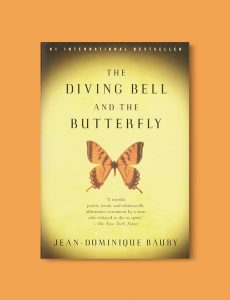

In magical sequences, he imagines traveling to other places and times and of lying next to the woman he loves. He explains the joy, and deep sadness, of seeing his children and of hearing his aged father’s voice on the phone. In the same way, he was able eventually to compose this extraordinary book.īy turns wistful, mischievous, angry, and witty, Bauby bears witness to his determination to live as fully in his mind as he had been able to do in his body. Almost miraculously, he was soon able to express himself in the richest detail: dictating a word at a time, blinking to select each letter as the alphabet was recited to him slowly, over and over again. After 20 days in a coma, Bauby awoke into a body which had all but stopped working: only his left eye functioned, allowing him to see and, by blinking it, to make clear that his mind was unimpaired. By the end of the year he was also the victim of a rare kind of stroke to the brainstem. It one of the most extraordinary books about the triumph of the human spirit ever written.In 1995, Jean-Dominique Bauby was the editor-in-chief of French Elle, the father of two young childen, a 44-year-old man known and loved for his wit, his style, and his impassioned approach to life. The Diving-Bell and the Butterfly records Bauby's lonely existence but also the ability to invent a life for oneself in the most appalling of circumstances. Using his only functioning muscle - his left eyelid - he was determined to tell his remarkable story, painstakingly spelling it out letter by letter. But his mind remained as active and alert as it had ever been. In December 1995, Jean-Dominique Bauby, editor-in-chief of French Elle and the father of two young children, suffered a massive stroke and found himself paralysed and speechless. One of the ten books - novels, memoirs and one very unusual biography - that make up our Matchbook Classics' series, a stunningly redesigned collection of some of the best loved titles on our backlist.


One of the most remarkable memoirs ever written.


 0 kommentar(er)
0 kommentar(er)
